Autism Spectrum Disorder
Understanding Autism is the first step towards creating a world of supportive treatment. Learn more below.
Imagine being in a foreign country
where you don’t speak the language and don’t understand the cultural norms. Your way of doing things seems right to you, but to others, it looks strange. There is a disconnect between your actions and intentions and what other people see. But this experience, is how it is for you everyday, even if you are not in a foreign country. For you, being autistic can feel like navigating an endlessly perplexing world of social interactions. What comes naturally to most people takes a lot of learning for you, especially social interactions, which require a lot of thought and planning.
Socializing can feel daunting and almost robotic, as if you have a mental checklist for how to interact with others. Additionally, you need to follow a routine, and any disruption to that routine can cause significant distress, even if you struggle to explain why. Communication with loved ones may leave you feeling misunderstood or micromanaged. You want to relate and feel understood, but it’s frustrating being trapped in a body that is only half loaded.
Or perhaps your loved one is autistic, their fixations or blunt remarks might sometimes sting. You notice their struggles with sensory sensitivities to loud noises, bright lights, or crowded spaces. You may worry that your child is falling behind in school due to their unique ways of doing things.
The truth is, Autism presents differently in everyone. Some individuals are high-functioning with high IQs but struggle with expressing emotions, while others may be more affectionate or sociable. There are those who prefer solitude, and others who feel lonely.
Living with autism presents its own challenges. Autism is a spectrum, and each person’s experience is unique, deserving of empathy and respect.
With understanding, patience, professional help, and a solid support system, finding balance and control is achievable.

Symptoms of Autism (ASD)

Early diagnosis and support are crucial for individuals with ASD to lead fulfilling lives.
Autism spectrum disorder (ASD) is a developmental condition that affects social interaction, communication, and behavior. Individuals with ASD may present limited and repetitive behaviors. The term “spectrum” in ASD represents the mixed symptoms and levels of severity associated with the disorder.
ASD manifests early in life and persists throughout an individual’s lifespan. While the exact cause remains unclear, research suggests a combination of genetic and environmental factors contributes to ASD development. Diagnosis is based on three distinct levels that depend on the symptoms and their impact on daily functioning.
The three levels of ASD that help us understand how much support someone might need include: Level 1 (high functioning), Level 2 (moderate functioning), and Level 3 (low functioning). Signs of ASD can appear in infancy, with some children showing reduced eye contact or delayed responses to their name. Each child demonstrates a unique pattern of behavior that can range from low to high functioning. The symptoms of ASD may overlap with ADHD and OCD, affecting learning abilities and social interactions.
Spectrum Disorder include social-emotional symptoms such as difficulties in social interactions, expressing emotions, maintaining eye contact, and forming friendships. Additionally, individuals may exhibit restricted and repetitive behaviors, including repetitive movements, obsessive interests, and a need for sameness.
Children with ASD might face several social challenges, like difficulty sustaining eye contact, interpreting others’ emotions, and responding to social cues. They may also exhibit communication issues, often demonstrated by delayed speech, repetitive language use (echolalia), and difficulties in starting conversations. Moreover, they might engage in repetitive behaviors, including arranging toys in precise orders or insisting on inflexible routines. Parents and caregivers should seek professional evaluation if they notice potential ASD symptoms in their child. This typically involves developmental screening and a comprehensive diagnostic evaluation, where observations and interviews are conducted to assess the child’s behavior.
Early diagnosis is crucial to providing appropriate support for individuals with ASD. Seeking help from healthcare professionals trained in autism evaluation is essential for an accurate diagnosis. Remember, autism is not a condition to overcome, but with proper support, individuals with ASD can lead fulfilling lives. To enhance the quality of life for those with autism, therapy options and educational resources are available. Accessing these services early on can make a significant difference in addressing the unique needs of individuals with ASD.
Treatment for Autism (aSD)

The goal of treatment is to maximize your ability to function.
Individuals diagnosed in childhood who did not receive treatment previously or only had limited therapy may exhibit a spectrum of behaviors that can hinder their everyday lives. If you are questioning why you think and act differently, it might be beneficial to seek help. Treatment for autism spectrum disorder depends on the specific issues involved, such as behavioral problems, anxiety, or depression, and is typically provided symptomatically. While there is no “cure” for Autism, it can be managed and a functional life can be attainable with proper interventions.
There are various therapeutic interventions available for individuals with autism spectrum disorder to address sensory concerns, disruptive behaviors, and social skills. The most effective therapy usually depends on the individual’s unique needs, abilities, and challenges.
Help can include a combination of Psychiatric Care from Godaelli Psychiatric Center alongside therapeutic care from specialists in Applied Behavior Analysis (ABA), Occupational Therapy (OT), Speech and Language Therapy, Physical Therapy (PT), support groups and/or educational resources.
For sensory concerns, Occupational Therapy with sensory integration is recommended. Applied Behavior Analysis (ABA) is crucial for individuals exhibiting behavior concerns, while social skills training is beneficial for addressing social concerns related to autism spectrum disorder. Educational assessments and accommodations in schools are also advisable for children with autism spectrum disorder.
Overall, the goal of treatment is to maximize your ability to function by reducing autism spectrum disorder symptoms and supporting your development and learning. Early intervention during the preschool years is crucial in helping individuals with autism spectrum disorder learn critical social, communication, functional, and behavioral skills.
Treatment options may also include other behavior and communication therapies, educational therapies, family therapies, and, in some cases, medications. In addition to autism spectrum disorder, individuals may also experience medical and mental health issues, for which proper management and support are essential. Planning for future opportunities, such as employment, college, and independent living, is also important for individuals with autism spectrum disorder.
Seeking professional help and support is key for individuals with autism spectrum disorder to succeed in various aspects of life, and it is important for both children and adults to receive the necessary assistance and care.
Care at Godaelli
At Godaelli Psychiatric, we believe in treating the whole person, not just the symptoms.
At Godaelli Psychiatric and Mental Health Center, we focus on comprehensive treatment, tackling both root causes and symptoms of mental health conditions.
Autism presents unique challenges, affecting daily life and social interactions. Our clinic provides tailored, holistic treatment plans to meet personal needs. Our care team conducts thorough evaluations, highlighting each person’s strengths and difficulties. With a commitment to understanding autism, we aim to support our clients and their families, empowering them to leverage their strengths, develop coping skills, and enhance their quality of life.
You are not alone in facing the challenges of autism. Godaelli Psychiatric and Mental Health Center is here to support you, providing the guidance and expertise needed to navigate life with confidence and tranquility.
Please feel free to reach out to the Godaelli Psychiatric and Mental Health Center at (703) 870-0738 or schedule an appointment with us online. We are proud to provide comprehensive psychiatric services to adults, children, and adolescents throughout Virginia
Navigate Autism: Together, we’ll journey from unfamiliar terrain to confident exploration.
